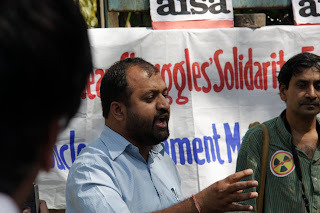





Source: http://www.flickr.com/photos/joeathialy/5559159368/in/set-72157626224553815/
Journal of Earth, Science, Economy and Justice (JESEJ) incorporates insights from the fields of sciences which have implications for Earth and her economy. This journal is an initiative of East India Research Council (EIRC), Centre for Economic History and Accountability (CEHA) and Jurists Association (JA).

+ comments + 1 comments
Here is a copy of the letter which Director General of CII Chandrajit Banerjee has written to the Hon’ble Minister of Science & Technology and Earth Sciences, on Civil Nuclear Liability Bill which is self explanatory.
24 August 2010
The Civil Liability for Nuclear Damage Bill 2010 (CNL) is a welcome move by the Government of India. The Bill will ensure quick compensation for people affected in the unlikely event of a nuclear incident, without the necessity of proving fault.
The industry believes that a nuclear liability legislation aligned with the International legal framework offers important benefits for Indian society, enabling guaranteed compensation to supplement what India provides under its domestic law. This would improve India’s energy security by diversifying its commercial nuclear technologies and sources for fuel as well as providing it with access to world–class technologies.
It is an essential step for cross–border business by Indian companies and foreign ones alike. And, adherence to an international legal framework would ensure that India is aligned with the modern global civil nuclear liability framework.
As per Clause 17 (b) of the Bill, after settling all CNL claims, Operator shall have right of recourse against the suppliers of equipment, raw materials and service providers.
This clause for CNL claim on Suppliers and Service Providers beyond their terms of supply, for 60 years plant life + 20 years of Claim Liability period, is perceived as a major deterrent by the Industry, for the following reasons: ∙ Typically 300–400 Nos Indian Suppliers / Service Providers are engaged for completing each nuclear power plant (both foreign as well as domestic design). It may not be practical for the Operator to have multiple recourse against all such Suppliers for CNL. ∙
If there is multiple recourse, suppliers will be required to take insurance cover for 60 + 20 years. Globally, there is no insurance coverage available for suppliers in the nuclear business. Further, as insurance cover is available for operators, international liability regimes use the channeling principle to make the operator’s liability absolute and exclusive, thus ensuring effective and timely settlement of nuclear damage claims.
Given this context, Indian suppliers and sub-suppliers (including Small & Medium Enterprises) will be precluded from conducting business in the nuclear power sector.
Foreign suppliers will also not be able to participate because of lack of insurance coverage. However, in the event that they do, they will pass–on the liability to Indian suppliers.
This will stall the growth of the nuclear manufacturing industry in India and, will be a setback for the Government’s plan to indigenize maximum supplies for the foreign technology plants.
We are also enclosing herewith the earlier representation made by CII, to the Parliamentary Standing Committee on Science and Technology, Environment & Forests, on this very important issue. We greatly value the role of the Government of India in taking into consideration the recommendations from the Industry, which is key in making this a success.
Yours sincerely
Chandrajit Banerjee
Post a Comment